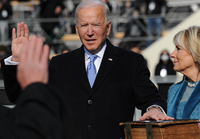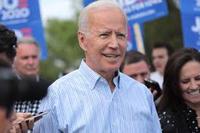How a Democratic Win in 2020 Would Influence the U.S.-Russia Relationship
Daniel Shapiro (Harvard University) and Nikita Gryazin (University of Oxford)
As the 2020 American presidential election approaches, Daniel Shapiro (Harvard University) and Nikita Gryazin (Oxford University) offer their thoughts on some areas in which the U.S.-Russia relationship would be affected should former Vice President Joe Biden emerge victorious.
The U.S.-Russia relationship, simply put, is not in a good place. In February, U.S. ambassador to Russia John Sullivan stated that the bilateral relationship is at the lowest point since the Cold War. On the Russian side, President Putin stated last year that relations between Russia and the United States are getting “worse and worse.” While many in Russia were cautiously optimistic about the future of the bilateral relationship following the election of Donald Trump in 2016, according to Andrey Kortunov, head of the Russian International Affairs Council, relations under Trump have gotten “significantly worse.” Would relations change should Joe Biden defeat Donald Trump in the 2020 election? In this paper, we lay out ways in which a Joe Biden presidency would positively and negatively impact U.S.-Russian relations.

A Biden presidency would have several potential negative effects on the U.S.-Russian relationship. For one, for many Democrats, the relationship with Russia is a touchy subject, as Russia’s actions in Ukraine and interference in American elections as well as suspicions surrounding the Trump/Putin relationship led public opinion on Russia to plummet. Biden himself has referred to Russian interference in American elections as “a threat to our [American] national security,” a view that would not go over well with the Kremlin, which denies interference. While the Trump administration downplayed the question of interference, Biden’s hard line on interference combined with overwhelmingly negative public opinion and a deeply skeptical Congress will likely not be conducive to repairing the relationship.
A Democratic administration could also continue to support Russian non-systemic opposition, democratic protests and movements. Moreover, in comparison to the Trump administration, Biden will most likely be considerably more attentive to human rights issues in Russia and beyond. In general, Democrats expect Russia to shift to liberal democracy, and in instances when Russia has chosen not to follow this path, tense bilateral relations have historically prevailed. Biden once asked rhetorically: “Are we a nation that embraces dictators and tyrants like Putin and Kim Jong Un?” Furthermore, Biden also believes that NATO is not obsolete, should continue to deter Russia and, “if necessary, defeat a Russian attack against one of the alliance's member states.” Assuming the U.S. and NATO emphasize Russian containment under a Biden presidency and the U.S. reasserts its presence in a strengthened NATO, Russia will be less likely to negotiate, much less cooperate, with the United States.
Additionally, in comparison to Trump’s bilateral approach to international relations, Biden favors a multilateral, institutions-based style of international relations. This style would potentially lead to more complex interplay between the U.S. and Russia in international organizations such as the UN, OSCE, WTO or even NATO institutions like the NATO-Russia Council. Russia has always prioritized bilateral dealings on global issues; thus, Biden’s multilateral approach could potentially lead to further misunderstandings.
However, despite these negative aspects, a Biden presidency would bring several key benefits for the U.S.-Russian relationship as well. For one, a Biden presidency would entail a renewed American commitment to cooperation on nuclear issues. Democrats, including Biden, broadly agree that the New START Treaty must be renewed. Currently, there are serious questions as to whether there will even be time to renew this treaty, given that it expires in 2021 and that both the United States and Russia have been hesitant at times to come to the table. However, this treaty is the last remaining major piece of bilateral arms control legislation, and should the Biden administration manage to extend the treaty in time, the bilateral arms control regime would greatly benefit, as would future dialogue between the U.S. and Russia. Biden has also expressed his readiness to rejoin the nuclear agreement with Iran, another point of potential cooperation for Russia and the United States.

America’s role in various other global issues would change as well under a Biden presidency. Biden has stated his commitment to bringing the vast majority of troops home from the Middle East and “narrowly defining” the U.S. mission to focus on defeating al-Qaeda and the Islamic State. This possibility of a reduced and more narrowly-focused American presence in the region could lead to greater bilateral cooperation in the fight against terrorism. Also, the U.S. would likely resume working with the international community, including Russia, to deal with climate change, a subject which has taken on more prominence in Russia lately.
Finally, broadly, a Biden victory in the 2020 presidential elections would ensure that one of Russia’s main stated desires would be satisfied: predictability. While Biden may not love Russia, his foreign policy aims are relatively mainstream and well-known. Also, Biden has a record of being willing to work to improve relations with Russia, as shown by his participation in the Obama-era Reset. While Russia has shown a propensity for exploiting instability, an American foreign policy toward Russia that is focused on level-headedness and strategic stability would help develop the framework for lasting dialogue between the U.S. and Russia.



